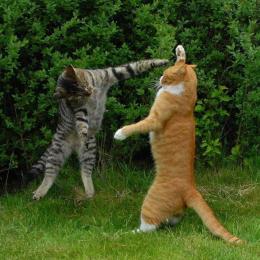My last session of the day features a panel of Dave Naylor from Bronco, Bill Hunt from Back Azimuth Consulting and Jonathan Beeston from Efficient Frontier battling it out in a head-to-head over the age old debate: Which search marketing tactic is the most cost effective, PPC or SEO? Moderating the battle is Jon Myers from Yahoo!.
 First up is Bill, setting the scene on PPC vs SEO. Why can’t we all just get along? is Bill’s first question. So first things – collaboration or cannibalisation? If you have both the top PPC and top organic result, what should we do? Is it working for that company? Some tests that have been run:
First up is Bill, setting the scene on PPC vs SEO. Why can’t we all just get along? is Bill’s first question. So first things – collaboration or cannibalisation? If you have both the top PPC and top organic result, what should we do? Is it working for that company? Some tests that have been run:
- Fortune 100 fixed the PPC snippet so it showed gibberish and saved $19,000 in PPC clicks
- A European travel company ranked number one for [Easter Holiday Deals] but the wrong page – gained £30,000 in booking after fixing this.
- Fortune 100 company had an organic listing with 30 to 1 conversion over PPC – the company adjusted the PPC message to reflect a similar one as the organic message and revenue increased by 400%
So what to do? Test and review your own data to find out – leverage co-optimisation. Look at where you are lacking/winning and use this as your test base. e.g. if you have high performing but expensive PPC keywords where you are not ranking organically, test working on these.
Coming back to Bill’s talk on using Missed Opportunity Matrix earlier from his talk on Key Points in Launching a Global Website – look to highlight missed potential, look at what an increase in clicks could potentially bring you in ROI.
- Combine and sort data to understand the current situation
- Adjust PPC ads to understand what collaboration could do
- Identify your desired share of opportunity and work to understand the best actions to take in order to main colloborative share
Next up is Jonathan Beeston talking on the paid search side, immediate describing SEO as blind guys poking an elephant. Ouch.
Jonathan highlights that Google is gradually getting rid of organic links showing a screenshot of SERPs with various paid options from local to PPC taking up most of the page.
PPC – Precise, Promotional, Compliant.
For Jonathan, you can do anything with PPC – running your ads when you want and to who you want. There is complete and precise control over what you do. There are opportunities to use different keyword matching, products, maps, testing your ads etc. Brand building can be done through PPC, with Jonathan using Ann Summers’ Chinese New Year Rampant Rabbit campaign as an example. He also points out that PPC ads now don’t even need to point to a site, using sites like Facebook to build their campaigns instead.
Now Dave Naylor is up, taking the organic side of things. He’s got Jonathan’s deck back up (he hasn’t actually got his own) so he’s re-using the PPC deck.
That SERPs screenshot. Google Places – that’s not PPC, it’s SEO. PPC is great for the big guys but SEO allows the little ones to compete. You have to earn that ranking. Organic SEO is no longer just about the old SERPs, it is also about newer areas such as Google Places.
Being on 24 hours a day – SEO never turns off. However it also never loses any money if you don’t switch it off/on at the right time. That should be considered a win.
Geo-targeting – cookies now mean that Google is also delivering the most relevant local, related organic results to searchers. However at a granular level, looking at control. SEO does not focus on being that specific or that granular. It looks to cover everything.
Maps/Products – this is not a PPC-specific feed. Your SEO should be able to handle this for you.
PPC – Ann Summers Rampant Rabbit. It’s not targeted and it’s not relevant. However it does create backlinks because people think it’s funny and therefore blog about it. It’s actually just linkbait.
At the end of the day, a well managed PPC campaign will always boost a good SEO campaign and vice versa. The bottom line is combining the two will often provide benefits.
The big question now is who should be responsible for things like Places. Naylor believes it is SEO. PPC is a clear, specific area which does not include those new areas.
Bill Hunt considers the search ecosystem – how do we divide each of those areas? We have created clear lines that separate paid, SEO, social etc. Most of the time this is managed by totally different agencies that do not communicate or work together. Can we own that ecosystem? If not, then you do need to take a side and pick what system you use. If you can fix yo r organisation, you could dominate your organic rankings and may not need PPC. If you can’t, you do need to buy your way in.
The debate is now raging not so much over SEO vs PPC but bidding on another brand’s name or not. Is it ethical? Should it be done? The case of Marks & Spencer being sued by Interflora for bidding on their brand is brought up as an example. No answer looking likely but the controversy rages on!
Image: Funny Cats






